URGENT!
Due to the weather, we are experiencing intermittent power outage and loss of internet. Please expect delays and or rescheduling of appointments during this time. We will reach out to you as soon as we can. Stay warm and stay safe!
Your cozy home and its inviting fireplace has the potential to attract unexpected guests – and we’re not talking about neighbors, in-laws, and your great-aunt Mildred. We’re talking about guests of the animal variety.
It’s not uncommon for animals to find their way into chimneys, seeking refuge from the elements or predators, or mistakenly stumbling upon what they perceive to be an ideal shelter. But once in your chimney, birds and mammals aren’t innocuous in their effects. How should you respond to an animal in your chimney system? And what preventative measures can you take to keep them out?
Here are some basics about what happens – and what action you should take – when animals find their way into your chimney. And if you have additional questions, be sure to reach out to see how we can help.
Some common chimney intruders include:
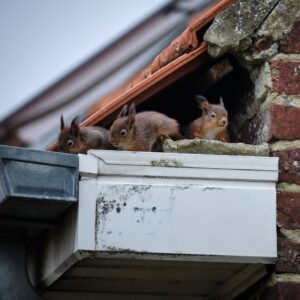 Birds. Chimneys often resemble natural nesting spots for birds, providing elevation and shelter for their nests.
Birds. Chimneys often resemble natural nesting spots for birds, providing elevation and shelter for their nests.It may seem harmless to have an animal nesting in your chimney, especially if it isn’t during the burning season, but there are a number of issues that playing host to wildlife can present.
Animals can obstruct the chimney flue, either with their bodies or with debris they create or carry in, preventing proper ventilation. These blockages can increase the risk of harmful gases like carbon monoxide entering your living space. Blockages also become fire hazards, increasing the risk of a chimney or other uncontained fire.
Animals don’t also create blockages in your flue, they can also create damage in your chimney system. Gnawing, scratching, and nesting can cause structural damage to your chimney’s interior. And there are health risks associated with animal droppings, parasites, and diseases that some animals carry, as well as the unpleasantness of noises and odors animals can generate.
If you suspect – or have confirmed – that there’s an animal in your chimney, there are two calls you may need to make. If a live animal is trapped and in distress, you can call animal control or a licensed wildlife removal service. They’ll use their training to try to execute a humane removal with attention to safety. Keep in mind that animals that are afraid can act unpredictably, so keep children and pets out of the way.
Calling your chimney technician may also contribute to animal removal, as we have tools that help us access different areas of your chimney system. In prefabricated fireplaces, animals may find their way into areas outside the flue, which will require specialized removal techniques.
Abstain from using your heating appliance if you have an animal issue. While some homeowners think smoke will drive animals out, if the animal is trapped or can’t make its way out and dies, your problem is increased rather than solved!
It’s important to know that one creature that’s particularly partial to chimneys is the aptly named chimney swift, a gray, acrobatic, migratory bird that can’t perch. Instead, chimney swifts cling to vertical surfaces, using their saliva to create nests to adhere to places like the inside of your chimney flue. These birds are protected by the Federal Migratory Bird Treaty Act, and removing an active nest is punishable by jail time and/or substantial fines. If you have a family of chimney swifts, you’ll need to wait for removal until all young have left the nest.
In addition to helping remove the animal, your chimney sweep technician should be called upon to sweep and inspect a chimney that’s recently been infested. With the animal removed, sweeping the chimney will clear any leaves, twigs, droppings, feathers, or other debris from the nooks and crannies of your chimney system. This will help ensure that your system is unobstructed and ready for safe use again. If you notice odors coming from your chimney, the animal may have expired and animal removal, sweeping, and inspection is also needed.
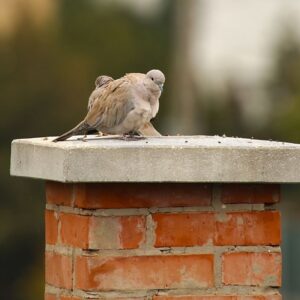 Another step to take once the animal is removed is asking your chimney professional about how to keep animals out in the future. This is one of those “an ounce of prevention is worth a pound of cure” cases.
Another step to take once the animal is removed is asking your chimney professional about how to keep animals out in the future. This is one of those “an ounce of prevention is worth a pound of cure” cases.
If you don’t have a chimney cap, or if it’s in disrepair, installing one will be an important first line of defense. A chimney cap sits on top of your flue, where it guards against anything entering your chimney. This won’t only help with animals, but other debris and precipitation that can be harmful for your system. The chimney cap covers the opening of your chimney exhaust while still allowing smoke and gases to vent.
Another helpful addition that may be recommended for your masonry fireplace chimney is a top-sealing damper, which helps control ventilation but would also aid in preventing animal intrusion by acting as a physical barrier. Finally, having your chimney inspected yearly will help identify and address potential entry points for wildlife and address them – as well as serving a number of other vital purposes.
While it’s disconcerting to realize an animal has made its way into your living space, don’t panic. We’re here to help, and to offer solutions to guard against recurrence. We’re in the business of helping you keep your chimney system running safely and optimally – and that includes wildlife staying in the wild and not in your chimney!
With some action steps and a little help from your friendly neighborhood pros here at Lords Chimney, you’ll be back to enjoying your fireplace soon. Call or reach out online now.
Do you hear scratching sounds throughout your house or smell foul odors from the fireplace? If so, you just might have unwanted animals in your chimney.
However, there’s no need to panic. With our experts on your side, you can prevent these unwelcome guests from causing bigger problems. The Lords Chimney crew is here to discuss the basics of animal removal, including signs to watch out for, the risks you face, and how to protect your home from a future intrusion.
Having small creatures in your flue might seem harmless, but it’s best to hire wildlife removal services as soon as possible to protect the health and safety of everyone in your home. Let’s go through some of the common signs of animals in your chimney.
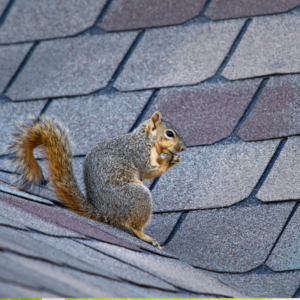 Fur & Feathers: In addition to droppings, you might also notice fur and feathers on your roof or fireplace. Once you see these signs, it’s a safe bet that they’re living in your flue. Birds, squirrels, and raccoons are the most popular chimney dwellers.
Fur & Feathers: In addition to droppings, you might also notice fur and feathers on your roof or fireplace. Once you see these signs, it’s a safe bet that they’re living in your flue. Birds, squirrels, and raccoons are the most popular chimney dwellers.If you notice any of the signs above, schedule a chimney evaluation immediately.
Animal removal services are the only way to remove your uninvited guests and restore your home to the calm and clean state it was in before. We’ll walk you through the ways in which these intruders can threaten your peace and damage your home.
So, how do you keep animals out of your chimney? We recommend the strategies below.
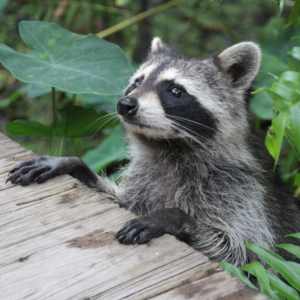 Seal Your Home: The easiest and most convenient way to keep animals out of your property is to seal your home. We recommend installing a quality and properly-sized chimney cap to achieve this. It’s also ideal to close any other openings in your home, including roof vents and any small gaps and cracks in your roof or walls.
Seal Your Home: The easiest and most convenient way to keep animals out of your property is to seal your home. We recommend installing a quality and properly-sized chimney cap to achieve this. It’s also ideal to close any other openings in your home, including roof vents and any small gaps and cracks in your roof or walls.Trust us on this – when it comes to unwanted animal guests, prevention is better than cure. If you’re interested in putting up some safeguards to prevent creatures from entering your home, we’re here to help.
At Lords Chimney, our technicians boast unmatched experience, and we use the latest technology to keep our customers’ chimneys, fireplaces, and dryer vents in peak condition all year long.
Call us now at 832-280-9233 or reach out online to request a free, no-obligation quotation.
A quiet evening at home is disrupted by scurrying, scratching, crying, or clawing sounds coming from the chimney. You have critters in the fireplace – but now what do you do?
Even animals that find their way into your chimney may not be able to get back out. Because of this, it is important to contact a wildlife rescue group or chimney sweep company experienced in safely removing animals as soon as possible.
Here at Lords Chimney, we can help. Call or book online with us now.
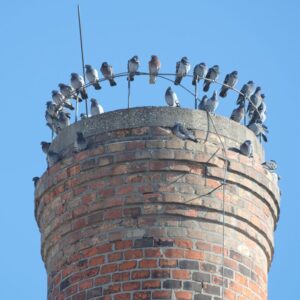 From small squirrels to large raccoons, animals view chimneys as safe, protected areas to build nests and hide from predators. This means that animals will sometimes do whatever it takes to get into a chimney – even to the point of damaging the masonry or other chimney components.
From small squirrels to large raccoons, animals view chimneys as safe, protected areas to build nests and hide from predators. This means that animals will sometimes do whatever it takes to get into a chimney – even to the point of damaging the masonry or other chimney components.
One of the most common ways that critters get into your fireplace is by a damaged chimney cap. Even tiny holes and gaps in the mesh or wire sides may be big enough to allow a small bird or rodent to squeeze through. Likewise, larger animals such as raccoon have been known to worsen chimney damage in an effort to get into the fireplace.
Unfortunately, only raccoons are able to climb the slick walls of the chimney again and again – all other animals may quickly become stuck, trapped, or disoriented in the dark chimney flue once they get in. Trapped animals often sound frantic, scratching, clawing, and beating their wings against the flue in an effort to get out.
It is important to leave animal removal to the professionals no matter how big – or small – the critter in your chimney is. Some birds, such as chimneys swifts, are protected by law under the Migratory Bird Treaty Act and cannot be removed until after they have nested. An animal removal professional will identify the type of animal in the chimney and help safely remove the critters with minimal chimney damage.
If you have animal in your chimney it is important to leave the damper fully closed. Even partially opening the damper can create a space large enough for the animals to squeeze into your fireplace. This then gives them access to the rest of your home – trust us, a bird trapped in a chimney is much easier to remove than one flying around your living room!
Homeowners should also not “smoke out” any animals. Doing this can further disorient or even kill the animals in the chimney while potentially igniting nesting materials and other debris.
A well maintained and regularly inspected chimney is often the best line of defense against animal entry. Chimney sweeps can help identify any areas of damage or deterioration where animals could potentially get in. Likewise, if you’ve had animal entry in the past we can help identify the areas the critters are getting in.
Having animals in your chimney system can lead to many issues down the line. First and foremost, their nesting materials cause blockages, which then cause poor ventilation. When it comes to running a fireplace, good ventilation is a key component in ensuring everything functions as it should. Once blockages form, you’ll face smoke backing up into your home, as well as other fumes and toxins.
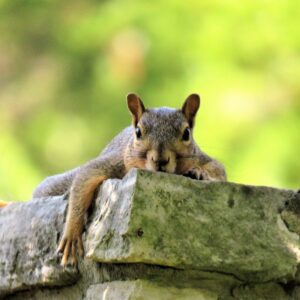 Another problem occurs when animals find their way in, but can’t find their way out. This is an unfortunate circumstance that often leads to death of the creature. This then causes foul odors to creep into your home and can lead to pest infestation, as well. The best thing to do is prevent them from entering at all, so you can save yourself a bunch of hassle.
Another problem occurs when animals find their way in, but can’t find their way out. This is an unfortunate circumstance that often leads to death of the creature. This then causes foul odors to creep into your home and can lead to pest infestation, as well. The best thing to do is prevent them from entering at all, so you can save yourself a bunch of hassle.
The last thing we would like to point out is the inability to remove certain types of birds. Chimney swifts, for example, are endangered, meaning we are not legally allowed to remove them until they officially abandon their nests for good. If one sets up camp in your chimney, you are stuck with them – and your fireplace will be out of use until they are gone.
If nesting or any kind gets lodged inside of your flue or chimney, you could face serious dangers when it comes time to light a fire. First of all, these materials are fire hazards. If they ignite, you could find yourself facing a chimney fire. These events can also cause extensive damage throughout your structure, which will require time-consuming and costly repair work before you can light a fire again.
Excess build up can also clog up your system, meaning smoke and poisonous gases could easily work their way into your home. If smoke does not successfully exit your chimney, you will have a smoke-filled living space. This can cause your furniture, curtains, and carpet to stink. It can also lead to carbon monoxide exposure, which can be deadly. The risk of illness, house fires, and even death increase dramatically when you have clogs and obstructions in your chimney. So why put your family and home at risk? Call our team of experts today to put your mind at ease.
From squirrels to swifts, critters can cause significant damage to your chimney system. If you have animals in your chimney or have had problems with animal entry in the past, contact Lords Chimney today!
There a few big things we can do to get animals out of your chimney – then keep them out for good.
Call on our team – or book online today – so you are all set and ready to go when cooler fall temperatures come back around!
Spring has officially arrived, and with the warmer temperatures and longer days come new babies for many different kinds of animals. Unfortunately, many birds and small mammals may view your chimney as the perfect place to build a nest and raise their young. While many animals and their nests can be safely and humanely removed if they get into your chimney, one cannot: the chimney swift.
A chimney swift can be recognized by their size, color, movements, and sounds. Chimney swifts are small birds with narrow bodies and long wings. While up close they are a brown-gray color, they may appear black when backlit against the sky. Swifts fly and twist side to side erratically, and have a distinct high pitched chirp.
Although chimney swifts spend their winters in South America, they migrate north to the eastern United States and Canada each spring to nest and raise their young. According to the Cornell Lab of Ornithology, “Their ability to travel over long distances and through a variety of habitats exposes them to a wide range of microorganisms.”
Chimney swifts got their name because of their unique ability to build nests that stick to the side of slippery flue tiles. While swifts traditionally prefer to nest in hollow or dead trees, the increase in size of cities, suburbs, and agricultural areas has forced them to adapt.
If birds take up residence in your chimney, your first reaction may be to have them removed as soon as possible. Unfortunately for many homeowners, chimney swifts and several other species of migratory bird are protected under the Federal Migratory Birth Treaty Act. This law makes it illegal for anyone to remove or destroy chimney swift nests, eggs, or hatchlings, with severe fines and penalties for anyone who violates the law.
Luckily for those dealing with an unexpected nest of chimney swifts, the birds have a relatively short nesting period. Chimney swifts can lay, hatch, and raise their young in about six weeks. Likewise, as they nest in the spring and summer when fireplaces are not typically in use, the presence of a chimney swift nest of often little more than a minor inconvenience.
Because chimney swifts cannot be removed once they have taken up residence in your chimney, the best thing homeowners can do to prevent them is to have their chimney regularly inspected. A chimney inspection can ensure that there are no areas for chimney swifts to enter through, such as a damaged chimney cap.
Likewise, because chimney swifts are migratory they tend to return to the same nesting ground each year. Because of this, if you have chimney swifts find their way into your chimney it is extremely important to have the chimney inspected and repaired after they leave. If not, you may find that your chimney becomes an annual summer home for a family of chimney swifts.
If you think you have birds in your chimney, contact Lord’s Chimney today. Our expert technicians will be able to find out if they can be removed as well as help prevent them from getting in again.